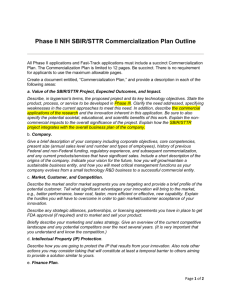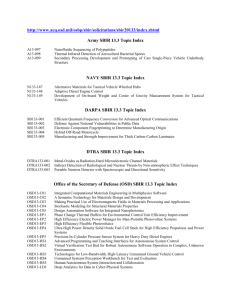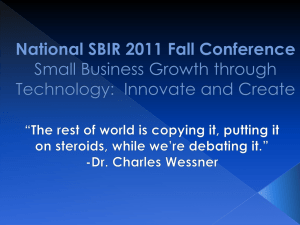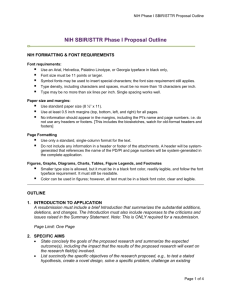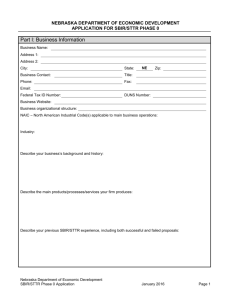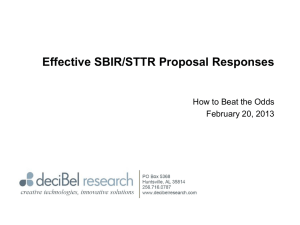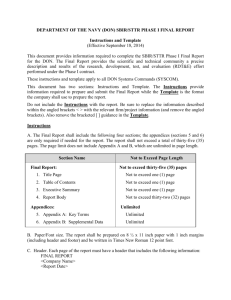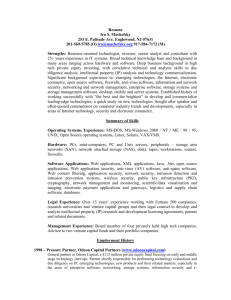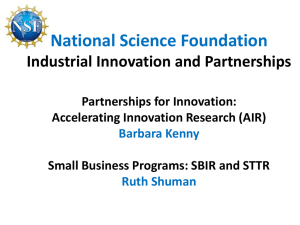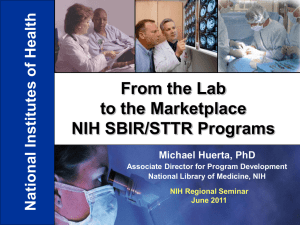SBIR-STTR Overview Presentation
advertisement
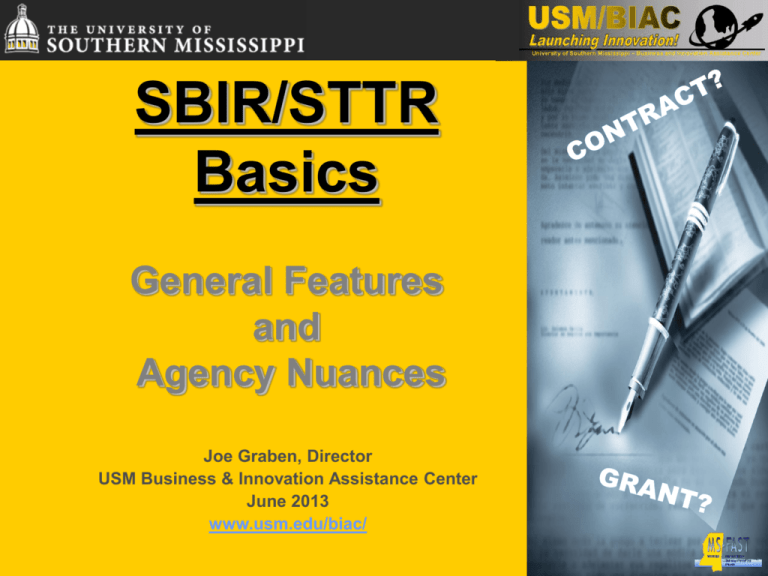
SBIR/STTR Basics General Features and Agency Nuances Joe Graben, Director USM Business & Innovation Assistance Center June 2013 www.usm.edu/biac/ SBIR/STTR Stand For: SMALL BUSINESS INNOVATION RESEARCH (SBIR) PROGRAM & SMALL BUSINESS TECHNOLOGY TRANSFER (STTR) PROGRAM Program Descriptions • SBIR: Set-aside program for small business concerns to engage in federal R&D -with potential for commercialization. • STTR: Set-aside program to facilitate cooperative R&D between small business concerns and U.S. research institutions -- with potential for commercialization. 3 Phase Programs • PHASE I Feasibility study $100-250k and 6 months (SBIR) or 12 months (STTR) • PHASE II Full R/R&D 2-Year Award and $1m (SBIR) or $750k (STTR) • PHASE III Commercialization Stage Use of non-SBIR Funds Eligibility Checkpoints Organized for- profit U.S. business At least 51% U.S.-owned and independently operated Small Business located in the U.S. P.I.’s primary employment with small business during project 500 or fewer employees Facts to Remember • Eligibility is determined at time of award • No appendices allowed in Phase I • The PI is not required to have a Ph.D. • The PI is required to have expertise to oversee project scientifically and technically • Applications may be submitted to different agencies for similar work • Awards may not be accepted from different agencies for duplicative projects SBIR-STTR Differences Research Partner SBIR: Permits (encourages) research institution partners [ 33% Phase I and 50% Phase II R&D] STTR: Requires research institution partners (e.g., universities) [ 40% small business and 30% research institution] AWARD ALWAYS MADE TO SMALL BUSINESS Critical Differences Principal Investigator SBIR: Primary (>50%) employment must be with small business concern STTR: Primary employment not stipulated (PI can be from research institution and/or from small business concern) Participating Agencies TOTAL ~ $2.4 B FY 2008 • • • • • • • • • • • DOD HHS NASA DOE NSF DHS USDA DOC EPA DOT ED SBIR/STTR SBIR/STTR SBIR/STTR SBIR/STTR SBIR/STTR SBIR/STTR SBIR SBIR SBIR SBIR SBIR Agency Differences • • • • • • • R&D Topic Areas Dollar Amount of Award (Phase I and II) Receipt Dates / Number and Timing of Solicitations Proposal Review Process Proposal Success Rates Type of Award (Contract or Grant) Many other details: Profit or fee allowed Phase I to Phase II gap funding Payment types and schedule Agency Differences Contracting Agencies Agency establishes plans, protocols, requirements Highly focused topics Procurement mechanism for DOD and NASA More fiscal requirements DOD NASA EPA DHS HHS/NIH* DOC DOT ED* Granting Agencies Investigator initiates approach Less-specified topics Assistance mechanism More flexibility HHS/NIH* NSF ED* * Awards Grants and Contracts DOE USDA Words of Advice Don’t judge an agency’s interests by its “name ” Understand agency’s mission & needs Get to know your agency Program Manager Read solicitation and follow instructions Words of Advice Don’t depend solely on SBIR funding Don’t go it alone - use support systems Have an outcome Win or lose - get and review evaluations Be PERSISTENT Contact To learn more about how the MS-FAST Program can help your company compete in the federal SBIR/STTR programs contact: Joe Graben, MBA Director – USM/BIAC Phone: (228) 688-2280 E-mail: Joseph.Graben@usm.edu "This U.S. Small Business Administration (SBA) Cooperative Agreement is partially funded by the SBA. SBA's funding is not an endorsement of any products, opinions, or services. All SBA funded programs are extended to the public on a nondiscriminatory basis."
